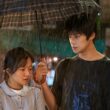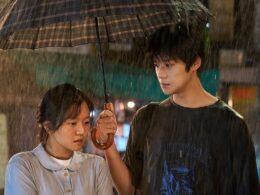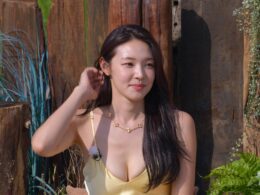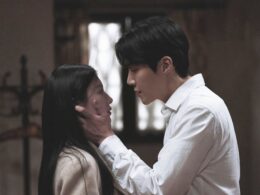Edited by Hwang Hong Sun
Translated by by Kim Hoyeun

Boyhood is a high school drama that has brought together director Lee Myung Woo, known for The Fiery Priest and One Ordinary Day, and actor Yim Si Wan. Set in 1989 in Chungcheongnam-do, the story revolves around Byung Tae (Yim Si Wan), a usual prey of bullies, who suddenly transforms into the top guy after moving to Buyeo. The drama, capturing Yim Si Wan’s spirited performance and oozing a retro vibe, is boosting viewership on Coupang Play and winning over audiences. Let’s delve into what makes Boyhood so captivating.
At the heart of Boyhood‘s appeal is the fascinating setup of a sudden reversal of social hierarchy. Byung Tae, the weakling in Onyang, is accustomed to fleeing from his tormentors. However, everything changes when he accidentally bumps into the legendary fist “Asan White Tiger” Gyung Tae (Lee Si Woo), and due to their similar names, Byung Tae is mistaken for the “White Tiger” at his new school, instantly becoming a hero among his peers.
The drama thrives on the amusing storyline where Byung Tae capitalizes on a rumor to turn his life around. Watching him assert he’s the “White Tiger” with convincing rhetoric, despite the obvious lies, and seeing everyone get fooled makes it hard to keep a straight face. Seeing Byung Tae outsmart stronger opponents by sheer luck and wit brings a peculiar satisfaction and vicarious pleasure. His precarious masquerade, teetering on the brink of exposure, keeps viewers on edge, all the while secretly hoping his real identity remains concealed.
Yim Si Wan elevates the drama with his skillful acting. Known for his upright and virtuous characters, he takes a 180-degree turn in Boyhood, portraying a quirky persona never shown before. His authentic Chungcheong-do dialect, combined with a character who is pitiable yet strangely winsome, adds vibrancy to the story. The scenes where he figures out the best way to feel less pain while getting beat up and cunningly maintains his false identity as the “White Tiger” are genuinely hilarious. Additionally, his awkward romance with Sun Hwa (Kang Hye Won), aka the Sophie Marceau of Buyeo, showcases his innocent charm. Yim Si Wan, unafraid to sacrifice his image, ensures the drama’s humor and enjoyment.

The combination of the Chungcheong-do vibe and the retro atmosphere is another charm of Boyhood. The leisurely but piercing dialect brings both laughter and a punch. The retro ambiance, depicting the late ’80s, is also eye-catching. Byung Tae perfectly executing dance moves of the then-popular singer Park Nam Jung, the characters’ quirky yet affable fashion, and places like roller rinks and neighborhood arcades, stir up nostalgia for that era.
Overall, Boyhood delivers delightful fun with its clever premise of an underdog becoming a top dog overnight, light-hearted humor, and Yim Si Wan’s flavorful acting. The ’80s vibe and the homely Chungcheong-do dialect play a significant role in seasoning the drama.
In episode 6, Byung Tae’s rise as the fake “White Tiger” hits a significant snag when his true identity is exposed. He’s now cast aside by his friends and no longer idolized by the bullies but turned into a punching bag. With increasing pressure from the real “White Tiger” Gyung Tae, he contemplates whether to continue school. Fortuitously, the ordeal has changed Byung Tae quite significantly. Unlike his past self, who would have run away, he chooses to face this daunting challenge head-on. The show seems set to earnestly portray the growth of a boy who stands up to the powerful. No longer a precarious king of a sandcastle, Byung Tae will realize his true value, ready to show real courage for his friends suffering from violence. As we root for his rebellion to succeed, we eagerly await the next chapter of Boyhood. (8/10)
Editor Hwang Hong Sun: A Korean movie buff who wishes that the warm messages in good works will warm up this world at least by one degree Fahrenheit.



















